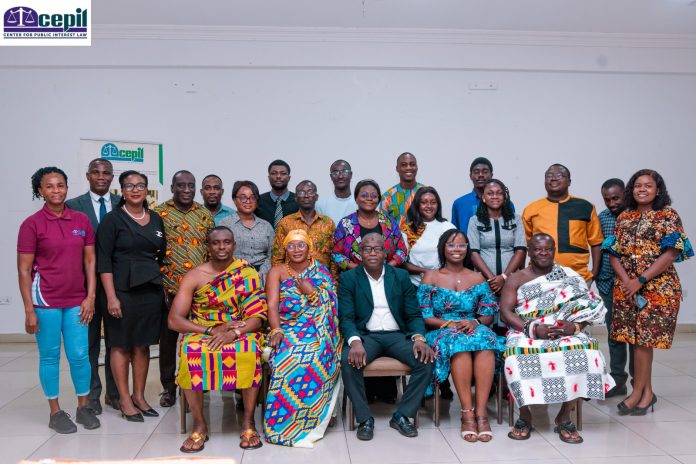Participants at a one-day stakeholder engagement forum on the Minerals Income Investment Fund (MIIF) Act, 2018 (Act 978), as amended, have made a strong case for either increasing mineral royalties allocated to the Minerals Development Fund (MDF) or repealing the Act altogether.
They strongly criticised the current allocation, where only 20% of mineral royalties go to the MDF, with a mere fraction benefiting mining communities, while a staggering 80% is allocated to MIIF, labeling the arrangement “unfair” and “insulting”.
According to the stakeholders, the skewed allocation of mineral royalties was a primary reason why mining communities, despite being the source of these resources, persistently trail behind in terms of development.
The forum, organised by the Centre for Public Interest Law (CEPIL) with support from Oxfam in Ghana, aimed to disseminate findings from an analysis of the MIIF Act.
It also sought to foster dialogue on governance and revenue transparency, promote advocacy for policy reforms, and empower civil society organisations (CSOs) and local communities to demand accountability in mineral revenue management.
In attendance were key stakeholders, including the Ghana Extractive Industry Transparency Initiative (GHEITI), Bank of Ghana (BoG), Natural Resource Governance Institute (NRGI), Minerals Development Fund (MDF), Chamber of Mines, as well as representatives from community groups impacted by mining, traditional authorities, CSOs, and the media.
The Country Director of BudgIT Ghana, Jennifer Addochoe Moffatt, in a presentation on a framework analysis of Ghana’s MIIF Act 2018, (Act 978) and Alignment with EITI Standards, identified several gaps in the Act.
Her analysis, which focused on a Framework Analysis and Alignment with the Extractive Industries Transparency Initiative (EITI) Standards, revealed that the MIIF Governance Framework lacked representation from crucial stakeholders, including civil society, mining companies, and communities.
She explained that this lack of representation could limit the incorporation of citizen concerns and needs, industry expertise and insights, and community concerns and needs in decision-making processes.
She indicated that limited enforcement of gender quotas beyond numerical targets. Other gaps in the MIIF Act included the absence of participatory mechanisms for communities to influence revenue allocation and the Act’s overreliance on the Minerals Development Fund (MDF) for community benefits.
Ms Moffatt also noted two significant concerns regarding the MIIF Act. “There are no mechanisms in place to prioritize marginalized groups, such as women and indigenous communities. Additionally, communities lack formal decision-making roles, which means they have limited input in decisions that affect their lives and livelihoods,” she indicated.
Against the backdrop of her analysis, she underscored the need for governance reforms that promote transparency, accountability, and inclusivity. To bridge the gaps in the MIIF Act, she advocated reforms that incorporate diverse stakeholders, ensure contract transparency, and adopt open data principles. Additionally, she stressed the importance of implementing equity measures that formalize benefit-sharing roles for marginalized groups.
In a welcome address, the Executive Director of CEPIL, Mr. Augustine Niber, lamented that despite Ghana’s rich mineral resources, it was challenging to track how revenue from these resources contributed to infrastructure development in local mining communities.
“The MIIF Act was passed to manage our mineral royalties and to be used for our development purposes. But what has been the impact of this Act on the development of Ghana?” he asked.
He raised concerns about the benefits of allocating a significant portion of Ghana’s mineral revenue to the MIIF, emphasising the need to set a limit on investments in this fund.







































